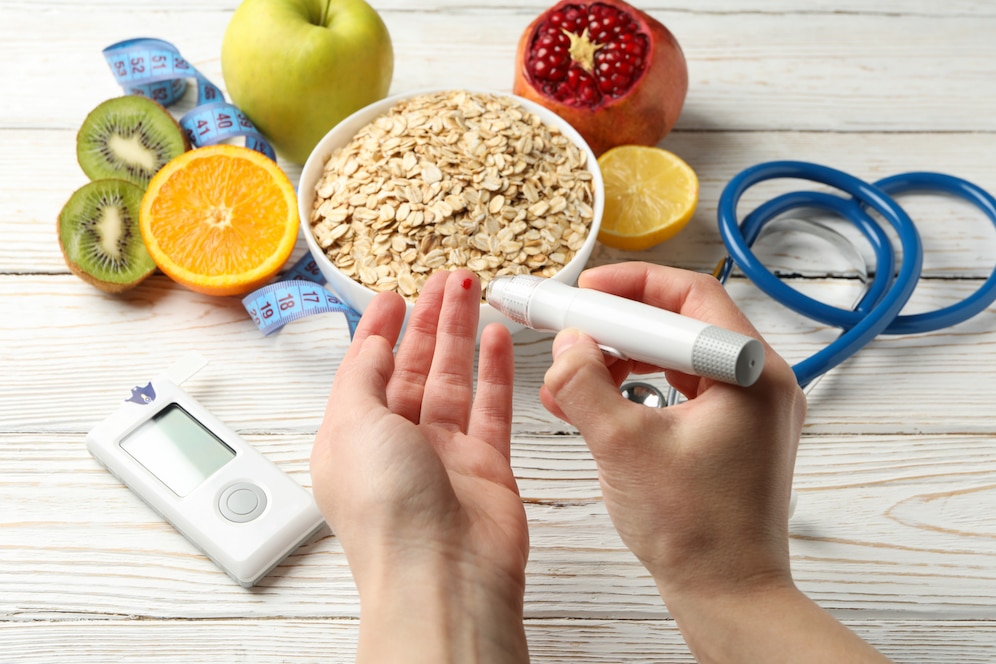Last updated on July 12th, 2025 at 01:10 pm

Diabetes is manageable
The number of people who have diabetes has been increasing yearly. Diabetes is caused by multiple hereditary and lifestyle factors that impact the body’s ability to produce enough insulin or to utilise it effectively. This leads to your body showing symptoms such as weight loss, increased urination, fatigue, stress, blurred vision, etc.
Many diabetic symptoms can be relieved by just taking care of how you live your life. If you are diabetic or prediabetic, this article will be the perfect guide to diabetic meal planning for you.
Include foods and vegetables in your diet plan
Diabetes meal planning includes cutting down on sugar or restricting its intake. Fruits and vegetables are a good option because they contain natural sugar, which is not harmful, unlike refined sugar from candies, chocolates, cakes, and packaged food. You should also avoid drinking cold drinks and fruit juices and add buttermilk, low-fat milk, lemonade, etc., to your diet.
Eat good carbohydrates
Educate yourself about the carbohydrates you include in your diet plan for diabetes. A diabetic meal plan should include high-fibre, nutrient-dense carbohydrates such as whole wheat, brown rice, chickpeas, whole oats, and more. You should ditch low-fibre, processed foods such as white bread, white rice, etc.
Include protein in your diet
Adding protein to your diabetic diet plan is vital because proteins lower blood glucose levels and prevent damage to blood vessels. Eat high-fibre foods such as pulses, raw or boiled veggies, beans, lentils, a handful of nuts, and eggs.
Don’t overeat red meat
Red meat is rich in saturated fats that can result in high blood glucose levels, triggering diabetic symptoms and putting pressure on your blood vessels. Eat lean protein such as chicken or omega-3-rich fish like salmon. Even if you are eating red meat like mutton, pork, etc., you need to moderate and monitor the quantity you consume.
Vitamins and minerals are vital
Vitamins prevent diabetes-related health complications. When your body is already fighting the symptoms of diabetes, a lack of vitamins can cause trouble. Eat more citrus fruits such as oranges, melons, strawberries, etc., as they are rich in vitamins A and C. Minerals such as zinc and magnesium help control blood glucose levels and diabetes-related complications.
The plate method
The plate method ensures you get all your body’s nutrition without going overboard on food portions. Fill half your plate with vegetables or leafy greens such as salad, broccoli, etc. Fill one-quarter with high-fibre foods like whole wheat, pasta, brown rice, and more. You can fill the remaining quarter with lean protein-rich foods such as eggs, fish, chicken, or tofu.
Here are a few tips to help you plan your diabetic meals better:
• Limit salt intake. Higher salt consumption increases diabetes symptoms as it increases blood pressure and heart disease risk.
• Eat at the right intervals. Timing your meals will help your body utilize the insulin generated effectively.
• Remember to make exercise or any form of physical activity a part of your routine.
Diabetes is a metabolic disorder that causes your body’s blood sugar levels to rise. Following these diabetic meal planning tips will control your blood sugar level. Consult a dietician or nutritionist to get customized diabetic meal plans. With a few lifestyle and dietary changes, you can lead a healthy, fit, and happy life ahead.
Buying medicines at competitive prices is now easier than ever with Medkart. Visit the Medkart website today for more information!
Diet Alone Isn’t Always Enough:
While healthy meal planning is a cornerstone of managing Type 2 diabetes, many people also require oral medicines to help keep blood sugar levels in check. EMPAONE 25MG Tablet/Linares E Tablet is one such option often prescribed by doctors to work alongside diet and exercise for more effective diabetes control.
FAQs
1. Can I eat snacks between meals?
Eating a snack once a day is recommended. You must time your meals properly so that the insulin produced in the body is utilized effectively. You can have a healthy green sprout salad or fruit in the evening.
2. Fruits also have sugar. Is it harmful to people with diabetes?
Fruits have natural sugar, unlike refined sugar in processed and packaged foods. Eating whole fruits is recommended as it is also a good source of vitamins and fibre.
3. Can diabetes increase the risk of heart conditions? How can I prevent it?
Research has found that people with diabetes are at a higher risk of heart conditions as high blood glucose levels are said to damage blood vessels. But with a proper diet plan and changes in your lifestyle, you can prevent such conditions.
4. Is it necessary to take diabetes medicines along with a strict diet plan?
Yes, it’s important to follow a proper diet and take diabetes medicines like Sitamet 50/500mg tablet. A healthy diet helps the medicine work better and keeps your blood sugar levels more stable.